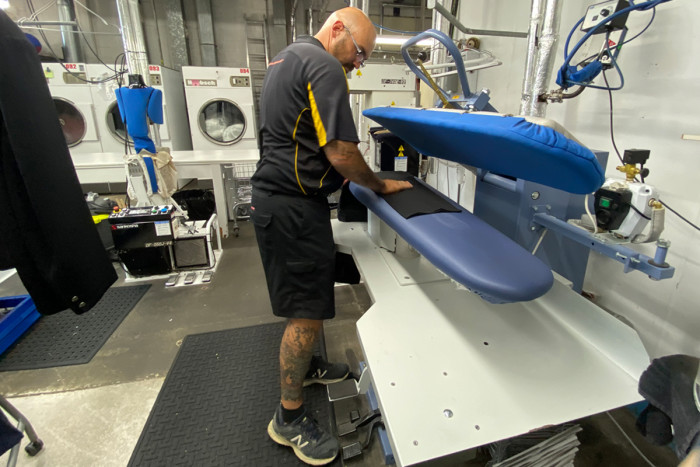Laundry Worker/Dry-cleaner
Kaimahi Horoi Kākahu/Kaiwhakamohani Kākahu
Alternative titles for this job
Laundry workers/dry-cleaners clean, wash and care for clothing, curtains and bedding.
Pay
Laundry workers/dry-cleaners usually earn
$24-$30 per hour
Source: La Nuova Apparelmaster, 2020.
Job opportunities
Pay
Pay for laundry workers/dry-cleaners varies depending on skills and experience.
- Laundry workers/dry-cleaners in training usually earn minimum wage.
- Experienced laundry workers/dry-cleaners can earn up to $30 an hour.
Source: La Nuova Apparelmaster, 2020.
- PAYE.net.nz website - use this calculator to convert pay and salary information
- Employment New Zealand website - information about minimum wage rates
(This information is a guide only. Find out more about the sources of our pay information)
What you will do
Laundry workers/dry-cleaners may do some or all of the following:
- take laundry from customers, calculate costs of work and record work to be done
- label and sort items to be cleaned
- inspect items for stains, and spot-clean as required
- load and unload dry-cleaning or washing machines and driers
- steam-press items
- iron, fold and pack cleaned laundry
- deliver items to businesses or private homes
- repair and alter clothing, if they offer these services.
Skills and knowledge
Laundry workers/dry-cleaners need to have:
- knowledge of different fabric types and how to care for them
- knowledge of chemicals and stain removers
- skill in operating washing, dry-cleaning and drying machines.
They may also need expertise in mending and alterations if the business they work for offers these services.
Working conditions
Laundry workers/dry-cleaners:
- work regular business hours, but may also work evenings and weekends, or do shift work
- work in commercial laundries, shops, factories, and laundries in hotels, hospitals or other organisations
- work in conditions that can be hot and may involve hazardous chemicals.
Entry requirements
There are no specific requirements to become a laundry worker/dry-cleaner, as you gain skills on the job.
However, a New Zealand Certificate in Laundry Processing (Level 2) or a New Zealand Certificate in Drycleaning (Level 3) may be useful.
Secondary education
No specific secondary education is required for this job, but English, maths and textiles to at least NCEA Level 1 are useful.
Personal requirements
Laundry workers/dry-cleaners need to be:
- quick, practical and methodical
- able to pay attention to detail
- careful and responsible
- good at basic maths.
Useful experience
Useful experience for laundry workers/dry-cleaners includes:
- work with fabric or textiles
- clothing retail work
- housekeeping.
Physical requirements
Laundry workers/dry-cleaners need to be reasonably fit as they have to lift heavy bags of laundry. They must also not be sensitive to chemicals used in the laundering or dry-cleaning processes.
Check out related coursesWhat are the chances of getting a job?
Demand limited for dry-cleaners and stronger for laundry workers
An ageing workforce is creating demand for dry-cleaners as they retire, but opportunities are still limited due to:
- it being a smaller occupation, with only about 350 dry-cleaners nationwide
- low turnover
- concerns about the environment and trends for less formal clothing leading to less demand for dry-cleaning services
- more people working from home, which has reduced demand for dry-cleaning suits and shirts.
Opportunities are better for laundry workers, as turnover is higher and the occupation is larger.
According to the Census, 2,877 laundry workers/dry-cleaners worked in New Zealand in 2018.
Demand for laundry workers highest during summer
Opportunities for laundry workers are usually best in summer when laundries either take on more temporary workers, or are open for longer hours. In 2021, employers reported higher demand in the regions due to there being more domestic tourists than in the cities.
Types of employers varied
Laundry workers/dry-cleaners may work for:
- small, privately owned laundry/dry-cleaning businesses
- larger laundry/dry-cleaning franchises
- hotels, hospitals and rest homes that have in-house laundries.
Sources
- Competenz, 'Laundry', accessed December 2020, (www.competenz.org.nz).
- Craig, B, managing director, La Nuova Apparelmaster, careers.govt.nz interview, December 2020.
- Stats NZ, '2018 Census Data', 2019.
(This information is a guide only. Find out more about the sources of our job opportunities information)
Progression and specialisations
Laundry workers/dry-cleaners may progress to set up or buy their own businesses, or move into supervisory or managerial positions.
Laundry workers/dry-cleaners usually specialise as one of the following:
- Dry-cleaner
- Dry-cleaners use chemicals to clean clothing.
- Laundry Worker
- Laundry workers wash, dry, fold and organise laundry.
Last updated 28 March 2025

